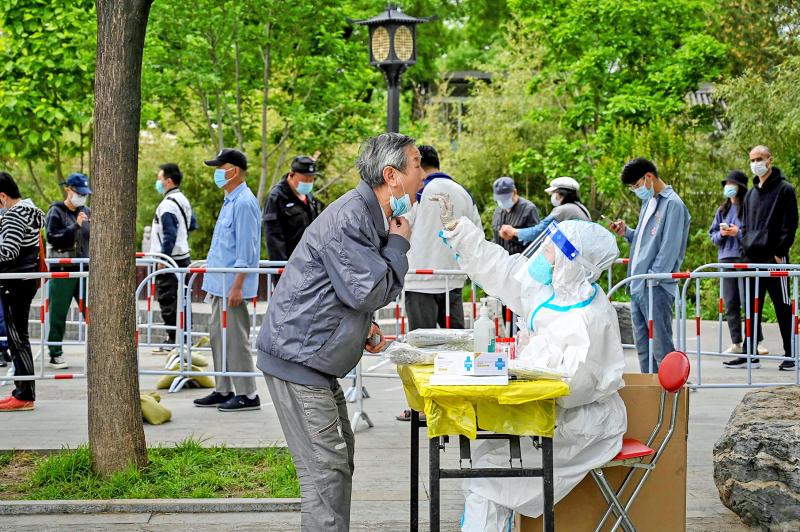China’s capital, Beijing, yesterday began a fresh round of mass testing for COVID-19, and shut more bus routes and metro stations as it seeks to avert the fate of Shanghai, where millions of residents have been locked down for more than a month.
The draconian movement curbs on Shanghai, an economic and financial hub, have caused frustration among its 25 million residents, and triggered rare protests over issues such as access to food and medical care as well as loss of income.
While some people have been let out for light and air in recent weeks, residents for the most part say they still cannot leave their housing compounds.

Photo: AFP
Shanghai cases have fallen for eight straight days and the city has said its outbreak is under effective control, allowing it to shut some of the makeshift hospitals it raced to build as case numbers ballooned.
However, authorities have also said that a full easing is still far off.
In an announcement underscoring that expectation, Shanghai officials postponed the city’s gaokao (高考) university entrance exam to early July. It took place in June last year and the last time it was postponed was in 2020, during the initial virus outbreak.
Chinese Communist Party Committee Secretary of Shanghai Li Qiang (李強), a close ally of Chinese President Xi Jinping (習近平), told a government meeting on Friday that it was “necessary to issue military orders at all levels, and take more resolute and powerful actions to overcome the great war and great tests,” an official statement said.
The number of infections in Shanghai outside areas under lockdown — a gauge of whether the city can further reopen — fell to 18 on Friday from 23 the day before. Total new cases declined slightly to about 4,000, data released yesterday showed.
Shanghai is also building thousands of permanent polymerase chain reaction testing stations, in line with other cities, as China looks to make regular testing a feature of everyday life.
China’s COVID-19 policy is increasingly out of step with much of the rest of the world, where governments have eased restrictions, or dropped them altogether, in a bid to “live with COVID-19” even as infections spread.
Beijing is striving to avoid an explosion in cases like that of Shanghai by conducting rounds of mass testing, banning restaurant dining-in services in multiple districts and shutting more than 60 subway stations, about 15 percent of the network.
Yesterday, it launched the first of three new rounds of daily testing in its biggest district, Chaoyang, home to embassies and large offices, and said residents in other areas where cases had been reported needed to take tests on the weekend.
The city reported 45 new symptomatic COVID-19 cases for Friday, down from 55 cases a day earlier. It recorded eight asymptomatic cases, which China counts separately, versus 17 a day earlier.

Auckland rang in 2026 with a downtown fireworks display launched from New Zealand’s tallest structure, Sky Tower, making it the first major city to greet the new year at a celebration dampened by rain, while crowds in Taipei braved the elements to watch Taipei 101’s display. South Pacific countries are the first to bid farewell to 2025. Clocks struck midnight in Auckland, with a population of 1.7 million, 18 hours before the famous ball was to drop in New York’s Times Square. The five-minute display involved 3,500 fireworks launched from the 240m Sky Tower. Smaller community events were canceled across New Zealand’s

The Ministry of Foreign Affairs (MOFA) yesterday said it is closely monitoring developments in Venezuela, and would continue to cooperate with democratic allies and work together for regional and global security, stability, and prosperity. The remarks came after the US on Saturday launched a series of airstrikes in Venezuela and kidnapped Venezuelan President Nicolas Maduro, who was later flown to New York along with his wife. The pair face US charges related to drug trafficking and alleged cooperation with gangs designated as terrorist organizations. Maduro has denied the allegations. The ministry said that it is closely monitoring the political and economic situation

‘SLICING METHOD’: In the event of a blockade, the China Coast Guard would intercept Taiwanese ships while its navy would seek to deter foreign intervention China’s military drills around Taiwan this week signaled potential strategies to cut the nation off from energy supplies and foreign military assistance, a US think tank report said. The Chinese People’s Liberation Army (PLA) conducted what it called “Justice Mission 2025” exercises from Monday to Tuesday in five maritime zones and airspace around Taiwan, calling them a warning to “Taiwanese independence” forces. In a report released on Wednesday, the Institute for the Study of War said the exercises effectively simulated blocking shipping routes to major port cities, including Kaohsiung, Keelung and Hualien. Taiwan would be highly vulnerable under such a blockade, because it

UNRELENTING: China attempted cyberattacks on Taiwan’s critical infrastructure 2.63 million times per day last year, up from 1.23 million in 2023, the NSB said China’s cyberarmy has long engaged in cyberattacks against Taiwan’s critical infrastructure, employing diverse and evolving tactics, the National Security Bureau (NSB) said yesterday, adding that cyberattacks on critical energy infrastructure last year increased 10-fold compared with the previous year. The NSB yesterday released a report titled Analysis on China’s Cyber Threats to Taiwan’s Critical Infrastructure in 2025, outlining the number of cyberattacks, major tactics and hacker groups. Taiwan’s national intelligence community identified a large number of cybersecurity incidents last year, the bureau said in a statement. China’s cyberarmy last year launched an average of 2.63 million intrusion attempts per day targeting Taiwan’s critical